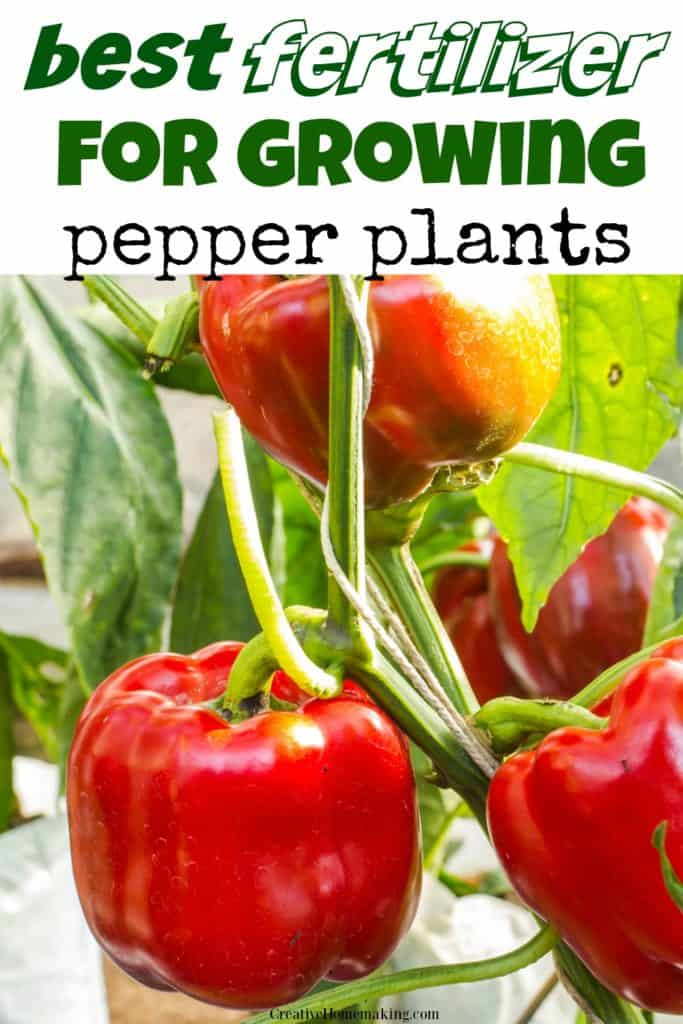Find Out the Best Fertilizers for Peppers: Top Picks for Optimum Growth
Find Out the Best Fertilizers for Peppers: Top Picks for Optimum Growth
Blog Article
Organic Vs. Synthetic Fertilizers: Which Is Best for Supporting Healthy And Balanced Pepper Plants?
In the world of supporting healthy pepper plants, the option in between organic and synthetic fertilizers stands as a critical choice with significant implications. While both options objective to offer vital nutrients to sustain plant growth, the subtleties of their impact on the soil, plant health and wellness, and the environment trigger a discussion that mirrors throughout the horticulture area. Comprehending the distinct benefits and prospective challenges of each plant food type is crucial for pepper cultivators looking for to maximize their yields while preserving an eco-conscious and sustainable method.
Advantages of Organic Plant Foods
Organic fertilizers provide a sustainable and environmentally-friendly strategy to nourishing pepper plants, offering necessary nutrients without making use of artificial chemicals. These all-natural plant foods are acquired from organic resources such as compost, manure, bone meal, and algae, advertising dirt health and wellness and biodiversity. Unlike artificial fertilizers, organic options launch nutrients gradually, guaranteeing a constant and well balanced supply for pepper plants to prosper.
One considerable advantage of natural plant foods is their capacity to enhance dirt structure and water retention. By improving dirt wellness, organic plant foods advertise advantageous microbial task, which assists in nutrient uptake by pepper plants. Additionally, organic plant foods lower the danger of chemical run-off, securing water resources from contamination and protecting the environment.
Moreover, natural plant foods add to lasting dirt fertility by advertising the development of useful soil microorganisms. These organisms assist damage down natural matter, releasing nutrients in a form that is conveniently obtainable to pepper plants. best fertilizers for peppers. By cultivating a healthy soil ecosystem, natural fertilizers support lasting pepper cultivation practices that benefit both plants and the environment
Downsides of Synthetic Fertilizers
Artificial plant foods, in contrast to their organic equivalents, position numerous disadvantages when utilized to nourish pepper plants, influencing both plant wellness and ecological sustainability. One significant disadvantage of artificial plant foods is their tendency to seep nutrients from the dirt promptly. This rapid leaching can lead to nutrition imbalances in the soil, creating plants to deal with toxicities or deficiencies. Furthermore, synthetic fertilizers can hurt beneficial soil microorganisms, such as earthworms and advantageous germs, interfering with the soil community's balance.
Moreover, the overuse of artificial plant foods can add to water pollution. Excess fertilizers not taken in by plants can remove right into water bodies, causing eutrophication, where algae flowers diminish oxygen degrees in the water, damaging marine life. In addition, artificial fertilizers are usually originated from non-renewable sources, such as nonrenewable fuel sources, adding to carbon emissions and ecological destruction throughout their production.
Nutrient Absorption Contrast
Efficient nutrient absorption plays an important role in the total health and wellness and development of pepper websites plants. When contrasting synthetic and natural fertilizers in regards to nutrient absorption, natural plant foods have the advantage of supplying an extra well balanced and slow-release source of nutrients (best fertilizers for peppers). Organic fertilizers include a selection of macro and trace elements that are not only useful for the plants yet additionally promote healthy and balanced soil microbial task, which assists in nutrient uptake. On the various other hand, synthetic fertilizers typically give a fast release of nutrients, which can result in leaching and overflow, resulting in lower nutrient absorption rates by the plants.
In addition, organic fertilizers enhance dirt structure and water retention capacity, enabling pepper plants to access nutrients a lot more effectively. This enhanced soil top quality promotes root advancement, allowing better nutrient absorption. Synthetic plant foods, although at first boosting plant development because of their high nutrient concentrations, might prevent lasting nutrient absorption by degrading dirt health over time.
Ecological Impact Factors To Consider

On the other hand, artificial plant foods, although commonly even more immediately available and concentrated to plants, can have my link damaging impacts on the environment otherwise applied appropriately (best fertilizers for peppers). Their manufacturing calls for high power inputs, leading to greenhouse gas emissions and adding to climate change. The drainage of excess artificial fertilizers can pollute water sources, leading to eutrophication and harming water environments.
Best Plant Food Practices for Peppers
To accomplish this, it is vital to follow best plant food techniques tailored to the certain needs of pepper plants. One essential technique is to perform a soil examination prior to applying any kind of plant foods.
An additional important practice is to feed pepper plants at the correct time. Usually, peppers gain from getting plant food at growing and afterwards again when they start to flower. Over-fertilizing can bring about nutrient continue reading this discrepancies and harm the plants, so it is essential to follow suggested application prices.
In addition, choosing a well balanced plant food with an NPK proportion that fits pepper plants' requirements is fundamental. Organic plant foods, such as compost or manure, can be excellent options as they release nutrients slowly and boost dirt structure over time. Nonetheless, synthetic plant foods can supply a quick nutrient boost when needed. Ultimately, integrating natural and artificial plant foods sensibly can aid nurture healthy pepper plants while reducing ecological influence.
Final Thought

Organic fertilizers offer a sustainable and environmentally-friendly technique to beneficial pepper plants, offering vital nutrients without the usage of artificial chemicals. Unlike artificial plant foods, organic options launch nutrients slowly, guaranteeing a stable and balanced supply for pepper plants to thrive.
Synthetic plant foods, in comparison to their natural equivalents, posture different disadvantages when utilized to nourish pepper plants, impacting both plant health and ecological sustainability. When comparing natural and synthetic plant foods in terms of nutrient absorption, natural plant foods have the advantage of providing an extra balanced and slow-release source of nutrients.Furthermore, organic fertilizers boost soil framework and water retention ability, permitting pepper plants to accessibility nutrients extra efficiently.
Report this page